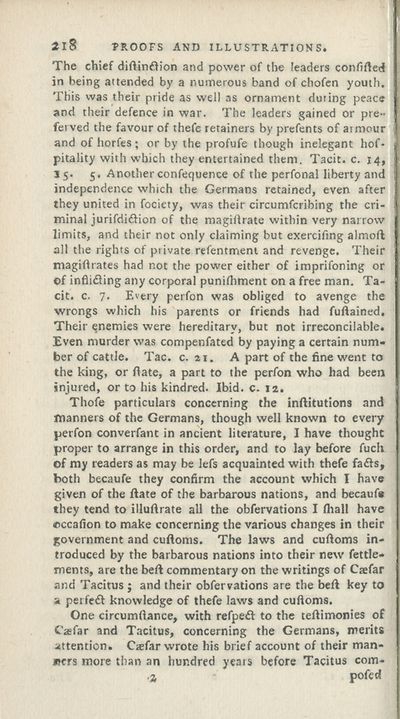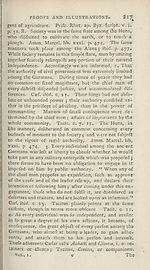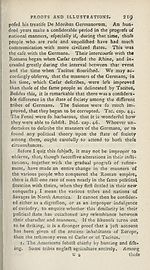Download files
Complete book:
Individual page:
Thumbnail gallery: Grid view | List view

2l8 troops and illustrations.
The chief diftinflion and power of the leaders confirted
in being attended by a numerous band of chofen youth.
This was their pride as well as ornament during peace
and their defence in war. The leaders gained or pre-
fet ved the favour of thefe retainers by prefents of aimour
and of horfes ; or by the profufe though inelegant hof-
pitality with which they entertained them. Tacit, c. 14,
15. 5. Another confequence of the perfonal liberty and
independence which the Germans retained, even after
they united in focicty, was their circumfcribing the cri¬
minal jurifdidHon of the magiftrate within very narrow
limits, and their not only claiming but exercifing almoft
all the rights of private refentment and revenge. Their
magiftrates had not the power either of imprifoning or
©f inflidling any corporal punilhment on a free man. Ta¬
cit. c. 7. Every perfon was obliged to avenge the
wrongs which his parents or friends had fuftained.
Their gnemies were hereditary, but not irreconcilable.
Even murder was compenfated by paying a certain num¬
ber of cattle. Tac. c. 21. A part of the fine went to
the king, or Hate, a part to the perfon who had been
injured, or to his kindred. Ibid. c. 12.
Thofe particulars concerning the inftitutions and
manners of the Germans, though well known to every
perfon converfant in ancient literature, I have thought
proper to arrange in this order, and to lay before fuch
of my readers as may be lefs acquainted with thefe fails,
both becaufe they confirm the account which I have
given of the ftate of the barbarous nations, and becaufe
they tend to illufirate all the obfervations I (hall have
occafion to make concerning the various changes in their
government and cuftoms. The laws and cuftoms in¬
troduced by the barbarous nations into their new fettle-
ments, are the beft commentary on the writings of Caefar
and Tacitus; and their obfervations are the beft key to
a perfeif knowledge of thefe laws and cufloms.
One circumfiance, with refpeft to the teftimonies of
C'aefar and Tacitus, concerning the Germans, merits
attention. Caefar wrote his brief account of their man¬
ners more than an hundred years before Tacitus com-
The chief diftinflion and power of the leaders confirted
in being attended by a numerous band of chofen youth.
This was their pride as well as ornament during peace
and their defence in war. The leaders gained or pre-
fet ved the favour of thefe retainers by prefents of aimour
and of horfes ; or by the profufe though inelegant hof-
pitality with which they entertained them. Tacit, c. 14,
15. 5. Another confequence of the perfonal liberty and
independence which the Germans retained, even after
they united in focicty, was their circumfcribing the cri¬
minal jurifdidHon of the magiftrate within very narrow
limits, and their not only claiming but exercifing almoft
all the rights of private refentment and revenge. Their
magiftrates had not the power either of imprifoning or
©f inflidling any corporal punilhment on a free man. Ta¬
cit. c. 7. Every perfon was obliged to avenge the
wrongs which his parents or friends had fuftained.
Their gnemies were hereditary, but not irreconcilable.
Even murder was compenfated by paying a certain num¬
ber of cattle. Tac. c. 21. A part of the fine went to
the king, or Hate, a part to the perfon who had been
injured, or to his kindred. Ibid. c. 12.
Thofe particulars concerning the inftitutions and
manners of the Germans, though well known to every
perfon converfant in ancient literature, I have thought
proper to arrange in this order, and to lay before fuch
of my readers as may be lefs acquainted with thefe fails,
both becaufe they confirm the account which I have
given of the ftate of the barbarous nations, and becaufe
they tend to illufirate all the obfervations I (hall have
occafion to make concerning the various changes in their
government and cuftoms. The laws and cuftoms in¬
troduced by the barbarous nations into their new fettle-
ments, are the beft commentary on the writings of Caefar
and Tacitus; and their obfervations are the beft key to
a perfeif knowledge of thefe laws and cufloms.
One circumfiance, with refpeft to the teftimonies of
C'aefar and Tacitus, concerning the Germans, merits
attention. Caefar wrote his brief account of their man¬
ners more than an hundred years before Tacitus com-
Set display mode to:
![]() Universal Viewer |
Universal Viewer | ![]() Mirador |
Large image | Transcription
Mirador |
Large image | Transcription
| Antiquarian books of Scotland > Kings & rulers > History of the reign of the Emperor Charles V. > Volume 1 > (236) |
|---|
| Permanent URL | https://digital.nls.uk/109185163 |
|---|
| Description | By William Robertson. London : Cadell and Davies, 1798. |
|---|---|
| Shelfmark | ABS.1.76.13 |
| Additional NLS resources: | |
| Description | Thousands of printed books from the Antiquarian Books of Scotland collection which dates from 1641 to the 1980s. The collection consists of 14,800 books which were published in Scotland or have a Scottish connection, e.g. through the author, printer or owner. Subjects covered include sport, education, diseases, adventure, occupations, Jacobites, politics and religion. Among the 29 languages represented are English, Gaelic, Italian, French, Russian and Swedish. |
|---|

